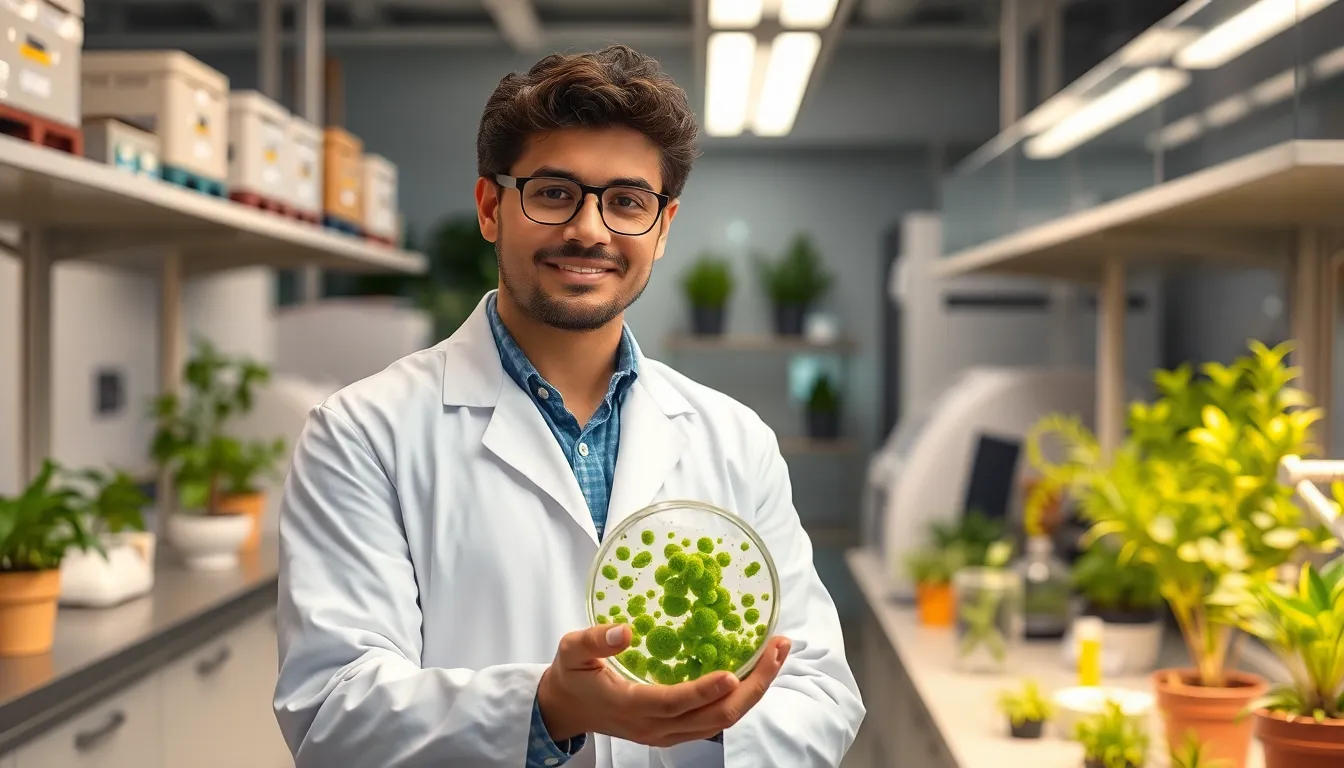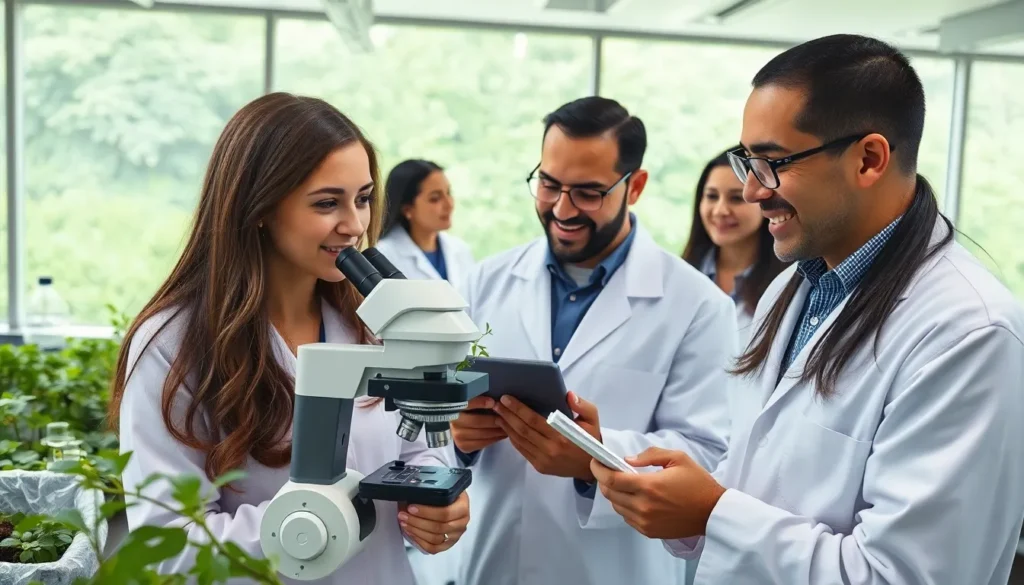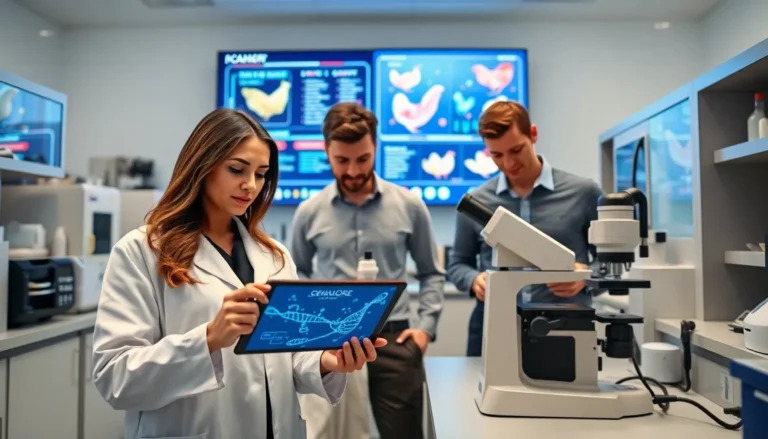In a world where “green” is more than just a color, biotech sustainability is the superhero we didn’t know we needed. Imagine a future where science and nature shake hands, creating solutions that not only save the planet but also give Mother Earth a much-deserved high-five. It’s not just about lab coats and petri dishes; it’s about crafting a sustainable future that’s as exciting as a rollercoaster ride through a forest of innovation.
Table of Contents
ToggleUnderstanding Biotech Sustainability
Biotech sustainability merges biotechnology with sustainable practices to address environmental challenges. This approach emphasizes innovative solutions that protect ecosystems while supporting human needs.
Definition and Importance
Biotech sustainability refers to the use of biotechnology to promote environmental health, resource conservation, and biodiversity. It plays a vital role in addressing climate change issues and resource scarcity. Through biotechnology, solutions like biodegradable materials and renewable energy sources emerge, enhancing ecological balance. The significance of these advancements extends to agriculture, manufacturing, and waste management. Each of these sectors benefits from reduced carbon footprints and improved resource efficiency.
Key Principles of Biotech Sustainability
Biotech sustainability revolves around several key principles. Conservation of biodiversity remains a primary goal, emphasizing the preservation of various species and habitats. Innovative practices in biomanufacturing reduce waste and increase efficiency, creating cleaner production methods. Additionally, the importance of resource management can’t be overstated; biotechnology optimizes resource use, ensuring sustainable practices within industries. Collaboration between scientists and other stakeholders fosters knowledge sharing and innovation. Each principle contributes to a coherent strategy that aligns ecological goals with technological advancements.
Current Innovations in Biotech Sustainability

Biotech sustainability currently showcases remarkable innovations that address environmental issues across various sectors. Advances in biotechnology unlock new potential for sustainable solutions that align with ecological goals.
Advances in Agricultural Biotechnology
Innovations in agricultural biotechnology enhance crop resilience to climate change. Scientists develop genetically modified organisms that require fewer resources while increasing yield. These advancements lead to reduced reliance on chemical fertilizers and pesticides, promoting healthier ecosystems. Additionally, the integration of precision agriculture utilizes data analytics to optimize farming practices, improving efficiency and sustainability in food production.
Sustainable Practices in Microbial Biotechnology
Microbial biotechnology focuses on using microorganisms for sustainable practices. These microorganisms play a pivotal role in biodegradation processes, breaking down waste materials into reusable resources. Bioremediation employs microbes to clean contaminated environments, offering eco-friendly solutions to pollution. Optimization of microbial production systems also contributes to the development of biofuels, reducing carbon emissions and fostering renewable energy sources.
Challenges Facing Biotech Sustainability
Biotech sustainability encounters several challenges that hinder its full potential. Factors range from environmental concerns to economic and social impacts.
Environmental Concerns
Environmental concerns pose significant barriers to the advancement of biotech sustainability. Regulatory issues often arise around the environmental release of genetically modified organisms. These regulations can slow down innovation that offers solutions to ecological challenges. Public perception also plays a role; skepticism surrounding biotechnology affects acceptance, which impacts adoption rates. Additionally, the long-term effects of these technologies on ecosystems remain uncertain. Comprehensive studies need to assess potential risks, ensuring safety and effectiveness. Addressing these concerns requires transparent communication and ongoing research to foster trust and acceptance.
Economic and Social Impacts
Economic and social impacts influence the trajectory of biotech sustainability. The high initial costs associated with biotechnology research and development deter some investors. Competing with conventional agricultural practices often proves difficult due to perceived risks and market volatility. Social inequality also surfaces; access to biotech innovations may vary for different communities, creating disparities. Policies addressing equitable access can improve outcomes for marginalized populations. Collaboration among stakeholders is essential; partnerships can leverage resources and knowledge for effective implementation. Balancing economic incentives with social responsibility shapes a sustainable future in biotechnology.
Future Prospects of Biotech Sustainability
Biotech sustainability shows immense promise for the future. This includes advancements that can significantly shift ecological and economic paradigms.
Emerging Technologies
Innovative technologies in biotechnology continue to evolve, enabling groundbreaking solutions. Cellular agriculture creates lab-grown meat products that reduce land use and greenhouse gas emissions. Gene editing techniques, such as CRISPR, improve crop performance, enhancing yield while minimizing resource inputs. Synthetic biology opens pathways for custom-designed organisms capable of producing sustainable materials like bioplastics and biofuels. These developments present opportunities for industries to adopt eco-friendly practices while meeting consumer demands for sustainability.
Policy and Regulation Trends
Government policies are shifting toward supporting biotech sustainability. New regulations are emerging to facilitate research on genetically modified organisms, streamlining approval processes for impactful innovations. Funding initiatives promote public-private partnerships aimed at fostering sustainable biotechnological advancements. Increasing international cooperation focuses on sharing best practices and harmonizing standards to ensure safe, responsible implementation. The trend toward transparency in biotech regulations addresses public concerns, paving the way for greater acceptance and trust in biotechnology’s role in sustainability.
Biotech sustainability represents a transformative approach to environmental stewardship. By merging innovative technologies with ecological practices, it offers tangible solutions to some of the most pressing challenges facing the planet. The potential for biotechnology to enhance resource efficiency and promote biodiversity is immense.
As advancements continue to emerge, the collaboration among scientists, policymakers, and communities will be crucial. This collective effort will ensure that the benefits of biotechnology are accessible and equitable. Embracing these innovations not only supports a healthier planet but also fosters a sustainable future for generations to come. The journey towards biotech sustainability is just beginning, and its promise is both exciting and essential.










